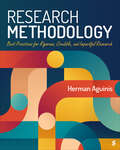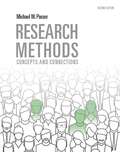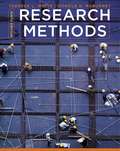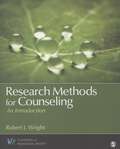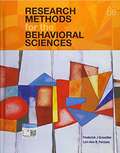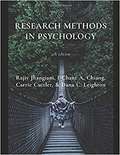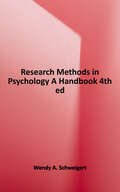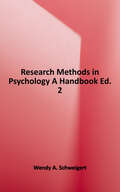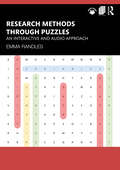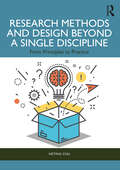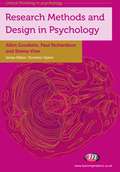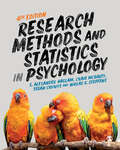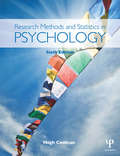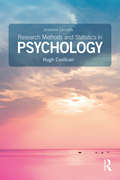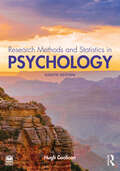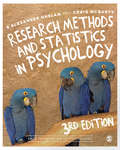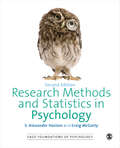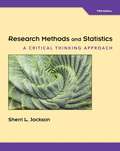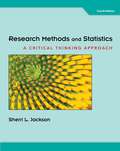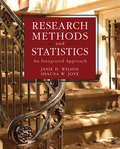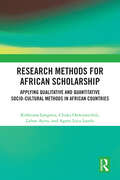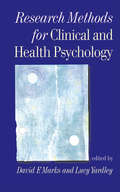- Table View
- List View
Research Methodology: Best Practices for Rigorous, Credible, and Impactful Research
by Herman AguinisResearch Methodology: Best Practices for Rigorous, Credible, and Impactful Research takes a 360-degree view of understanding and doing research, helping readers become expert researchers, reviewers, and consumers of research. Renowned author, journal editor, and researcher Herman Aguinis distills the vast body of work on methodological best practices into a singular experience. Each of the 16 chapters thoroughly explains a different aspect of methodology step by step, from choosing useful and compelling research topics to reporting results accurately and credibly. Researchers at all career stages will find this text helpful to structure and conduct high-impact empirical research aimed at producing a thesis, dissertation, or journal publication. Research consumers will find instruction on how to evaluate the rigor and credibility of research conducted by others. Instructors will find the book’s modular approach refreshing by assigning students the most relevant topics—from checklists of best practices to an in-depth treatment of a methodology. Filled with "how-to’s" and "dos and don’ts", figures, hands-on exercises, and "Methods in Practice" boxes that summarize and apply best practices, this book is a must-have for anyone interested in producing or reading research. Included with this title: LMS Cartridge: Import this title’s instructor resources into your school’s learning management system (LMS) and save time. Don’t use an LMS? You can still access all of the same online resources for this title via the password-protected Instructor Resource Site. Learn more.
Research Methods
by Michael W. PasserWith over two decades of classroom experience, Michael Passer knows how to guide students through the ins and outs of research methods in ways they can actually understand and put into practice. In this remarkable text, Passer’s experience leads to chapters filled with clear explanations, resonant examples, and contemporary research from across the breadth of modern psychology, all while anticipating common questions and misunderstandings.
Research Methods (Ninth Edition)
by Donald H. Mcburney Theresa L. WhiteNow in its 9th Edition, RESEARCH METHODS provides psychology students with a scientific approach to understanding their field of study and the world in general. The text's logical, step-by-step coverage is the result of decades of author experience. It includes all of the stages of the research process, from selecting the project and searching for literature, to choosing a protocol and getting published. RESEARCH METHODS also presents students with problems from selected psychological literature to demonstrate some of the creative ways psychology professionals design and conduct effective research.
Research Methods For Counseling: An Introduction
by Robert J. WrightResearch Methods for Counseling: An Introduction provides a rich, culturally sensitive presentation of current research techniques in counseling. Author Robert J. Wright introduces the theory and research involved in research design, measurement, and assessment with an appealingly clear writing style. He addresses ways to meet the requirements of providing the data needed to facilitate evidence-based therapy and interventions with clients, and also explains methods for the evaluation of counseling programs and practices. This comprehensive resource covers a broad range of research methods topics including qualitative research, action research, quantitative research including, sampling and probability, and probability-based hypothesis testing. Coverage of both action research and mixed methods research designs are also included.
Research Methods For The Behavioral Sciences
by Frederick J. Gravetter Lori-Ann B. ForzanoSee how interesting experimental and nonexperimental research can be with RESEARCH METHODS FOR THE BEHAVIORAL SCIENCES, 6th Edition. Inviting and conversational, the text leads you through the research process from start to finish -- using a step-by-step approach that emphasizes the decisions researchers make at each stage. Current research examples are selected to be of particular interest to students like you, and learning objectives help you focus on what's important. Chapter after chapter, the authors' "lecture in a book" style delivers clear explanations of topics that make this text easy to read and understand.
Research Methods In Psychology
by I-Chant A. Chiang Rajiv S. Jhangiani Carrie Cuttler Dana C. LeightonA comprehensive textbook for research methods classes. A peer-reviewed inter-institutional project. This adaptation constitutes the fourth edition of this textbook, and builds upon the second Canadian edition by Rajiv S. Jhangiani (Kwantlen Polytechnic University) and I-Chant A. Chiang (Quest University Canada), the second American edition by Dana C. Leighton (Texas A&M University-Texarkana), and the third American edition by Carrie Cuttler (Washington State University) and feedback from several peer reviewers coordinated by the Rebus Community. This edition is licensed under a Creative Commons Attribution-NonCommercial-ShareAlike 4.0 International License.
Research Methods In Psychology: A Handbook
by Wendy A. SchweigertSuitable as a primary text or as a supplement, this versatile handbook is ideal for any research-oriented psychology course. Each chapter independently covers a commonly used research method, giving instructors the flexibility to tailor the book to meet the needs of their courses. Chapter outlines, concept questions and exercises (along with a selected set of answers), lists of important terms and concepts, and clearly written explanations of basic statistical techniques are among the book's many notable features. Basic guidelines of how to write, format, and publish research results emphasize a hands-on approach to conducting psychological research. The Third Edition includes a new full chapter on literature searches and more information on the Internet's role in various facets of research. Schweigert's clear, succinct writing style, her focus on the fundamentals of research design, and her thorough coverage engage students who are at all levels of exposure to research methods. In the end, all students will learn to embrace the ethics and process of collecting and presenting useful, accurate data.
Research Methods In Psychology: A Handbook
by Wendy A. SchweigertPerfect as a main text or as a supplement, this versatile handbook is ideal for psychology courses devoted specifically to research methods as well as for more general psychology courses with a research component. Each chapter independently covers a commonly used research method, giving instructors the flexibility to assign chapters in a way that meets the needs of their own classes. Chapter outlines, concept questions and exercises (along with a selected set of answers), lists of important terms and concepts, and written explanations of basic statistical techniques supplemented with illustrative statistical tables are among the book's many outstanding features. Basic guidelines of how to write, format, and publish results demonstrate an astute, hands-on approach to conducting research in psychology.
Research Methods Through Puzzles: An Interactive and Audio Approach
by Emma RandlesDive into the world of research with this interactive puzzle book. Whether you're just starting out with research methods or looking to refresh your knowledge on the basics, this book offers a fun and engaging way to get to grips with everything research related. You'll explore key topics like variables, sampling methods, experimental design, reliability, and validity—plus so much more!With clear, easy-to-follow explanations, you’ll learn how to control variables, understand different types of data, develop hypotheses, ensure reliability and validity, and choose the right statistical tests. Each concept is paired with puzzles to help you consolidate what you’ve learned. And to make it even easier, each chapter has support material in the form of a helpful audio guide to walk you through the material.This book takes a conversational approach to make learning research methods feel less intimidating, and more enjoyable! Whether you're a student or just someone interested in research, this puzzle book turns learning research methods into an engaging and fun activity.
Research Methods and Design Beyond a Single Discipline: From Principles to Practice
by Heting ChuResearch Methods and Design Beyond a Single Discipline presents and discusses 15 research methods after an overview of each, an illustration of the research process, and an examination of related topics. The focus of this book is on data collection techniques (e.g., interviewing, observation, questionnaires) and research design.Research methods are named and categorized by data collection techniques in this book rather than by the quantitative and qualitative dichotomy used for data analysis techniques. Each of the 15 research methods included in the book is depicted regarding its functions, features, applications, and dos and don’ts, with examples and case studies from various disciplines. Research methodology development in research design starts with selection of data collection techniques, which takes into consideration research questions of a study and research method features. Data analysis techniques and selection are described as part of the research methodology development to help readers choose the most appropriate methodology for their own research, and put research design into practice.This book is essential for masters and doctoral students, and researchers who wish to learn about research methods and design comprehensively and systematically, as well as instructors delivering research methods courses across the social and behavioral sciences.
Research Methods and Design in Psychology (Critical Thinking in Psychology Series)
by Dr Allen Goodwin Dr Paul Richardson Dr Emma VineElectronic Inspection Copy available for instructors here This accessible introductory text addresses the core knowledge domain of research methods. It provides concise coverage of the central concepts, techniques, problems and debates in this key area, while encouraging a critical approach and developing students' higher level skills. Activities help readers build the underpinning generic critical thinking and transferable skills they need in order to become independent learners, and to meet the relevant requirements of their programme of study. The text provides core information on designing psychology research studies with key chapters on both quantitative and qualitative designs. Other chapters look at ethics, common problems, and advances and innovations.
Research Methods and Statistics in Psychology
by S. Alexander Haslam Tegan Cruwys Craig McGarty Niklas K. SteffensUpdated with new chapters on multiple regression and high-level research methods, this 4th edition of Research Methods and Statistics in Psychology delivers all you need to develop a practical understanding of both quantitative and qualitative approaches to research in psychology. In particular, this book guides you through the range of choices and considerations involved in research design, data analysis and report presentation. Your learning is supported by a range of features, both in the book and online. These include: Research Bites, to provide you with practical insights that arise from the most current research practice Test yourself questions, to check your understanding Exercises, to test your knowledge Glossary, to help you with key terms Research evaluation and improvement checklists – quick summaries of best practice for you to refer to Online appendices, including data sets to practice with! And much more… S. Alexander Haslam is Professor of Psychology and Laureate Fellow at the University of Queensland Craig McGarty is an adjunct professor at Western Sydney University Tegan Cruwys is Associate Professor and NHMRC Emerging Leadership Fellow at the Australian National University Niklas K. Steffens is Associate Professor and Director of the Centre for Business and Organisational Psychology at the University of Queensland
Research Methods and Statistics in Psychology
by S. Alexander Haslam Tegan Cruwys Craig McGarty Niklas K. SteffensUpdated with new chapters on multiple regression and high-level research methods, this 4th edition of Research Methods and Statistics in Psychology delivers all you need to develop a practical understanding of both quantitative and qualitative approaches to research in psychology. In particular, this book guides you through the range of choices and considerations involved in research design, data analysis and report presentation. Your learning is supported by a range of features, both in the book and online. These include: Research Bites, to provide you with practical insights that arise from the most current research practice Test yourself questions, to check your understanding Exercises, to test your knowledge Glossary, to help you with key terms Research evaluation and improvement checklists – quick summaries of best practice for you to refer to Online appendices, including data sets to practice with! And much more… S. Alexander Haslam is Professor of Psychology and Laureate Fellow at the University of Queensland Craig McGarty is an adjunct professor at Western Sydney University Tegan Cruwys is Associate Professor and NHMRC Emerging Leadership Fellow at the Australian National University Niklas K. Steffens is Associate Professor and Director of the Centre for Business and Organisational Psychology at the University of Queensland
Research Methods and Statistics in Psychology
by Hugh CoolicanThis sixth edition of Research Methods and Statistics in Psychology has been fully revised and updated, providing students with the most readable and comprehensive survey of research methods, statistical concepts and procedures in psychology today. Assuming no prior knowledge, this bestselling text takes you through every stage of your research project giving advice on planning and conducting studies, analysing data and writing up reports. The book provides clear coverage of statistical procedures, and includes everything needed from nominal level tests to multi-factorial ANOVA designs, multiple regression and log linear analysis. It features detailed and illustrated SPSS instructions for all these procedures eliminating the need for an extra SPSS textbook. New features in the sixth edition include: "Tricky bits" - in-depth notes on the things that students typically have problems with, including common misunderstandings and likely mistakes. Improved coverage of qualitative methods and analysis, plus updates to Grounded Theory, Interpretive Phenomenological Analysis and Discourse Analysis. A full and recently published journal article using Thematic Analysis, illustrating how articles appear in print. Discussion of contemporary issues and debates, including recent coverage of journals' reluctance to publish replication of studies. Fully updated online links, offering even more information and useful resources, especially for statistics. Each chapter contains a glossary, key terms and newly integrated exercises, ensuring that key concepts are understood. A companion website (www.routledge.com/cw/coolican) provides additional exercises, revision flash cards, links to further reading and data for use with SPSS.
Research Methods and Statistics in Psychology
by Hugh CoolicanThe seventh edition of Research Methods and Statistics in Psychology provides students with the most readable and comprehensive survey of research methods, statistical concepts and procedures in psychology today. Assuming no prior knowledge, this bestselling text takes you through every stage of your research project giving advice on planning and conducting studies, analysing data and writing up reports. The book provides clear coverage of experimental, interviewing and observational methods, psychological testing, qualitative methods and analysis and statistical procedures which include nominal level tests, multi-factorial ANOVA designs, multiple regression, log linear analysis, and factor analysis. It features detailed and illustrated SPSS instructions for all these and other procedures, eliminating the need for an extra SPSS textbook. New features to this edition include: Additional coverage of factor analysis and online and modern research methods Expanded coverage of report writing guidelines References updated throughout Presentation updated throughout, to include more figures, tables and full colour to help break up the text Companion website signposted throughout the book to improve student usability Improved and extended web links and further reading associated with every chapter. Each chapter contains a glossary, key terms and newly integrated exercises, ensuring that key concepts are understood. A fully updated companion website (www.routledge.com/cw/coolican) provides additional exercises, testbanks for each chapter, revision flash cards, links to further reading and data for use with SPSS.
Research Methods and Statistics in Psychology
by Hugh CoolicanResearch Methods and Statistics in Psychology provides students with the most readable and comprehensive survey of research methods, statistical concepts and procedures in psychology today. Assuming no prior knowledge, this bestselling text takes you through every stage of your research project, giving advice on planning and conducting studies, analysing data and writing up reports, both quantitative and qualitative. It incorporates diversity and includes a large section on cross-cultural psychology methods and issues. The book continues its long tradition of integrating qualitative issues into methods chapters as well as providing two chapters dedicated to qualitative methods. It provides clear coverage of experimental, interviewing and observational methods; psychological testing; and statistical procedures which include nominal-level tests, ordinal and interval two-condition tests, simple and multi-factorial ANOVA designs, correlation, multiple regression, log linear analysis, factor analysis and, new with this edition, logistic regression. It features detailed and illustrated SPSS instructions for all these and other procedures, eliminating the need for an extra SPSS textbook. New edition features include: • Logistic regression. • Greater detail of online research methods. • Expanded coverage of report writing guidelines. • Concepts illustrated with up-to-date published research examples. • Instructor and Student Resource website signposted throughout the book to improve student usability. Each chapter contains a glossary, key terms and newly integrated exercises, ensuring that key concepts are understood. This book is extended and enhanced by a fully updated and refreshed Instructor and Student Resource website, which includes: • A collection of interactive multiple-choice questions with detailed feedback, providing the opportunity to test understanding at different levels. • Practical exercises that give students the opportunity to put their learning into practice. • Links to further reading and sources to expand knowledge. • Test banks for each chapter to save instructors time. Access the website at: www.routledge.com/cw/coolican.
Research Methods and Statistics in Psychology (SAGE Foundations of Psychology series)
by S. Alexander Haslam Craig McGartyThe third edition of Haslam and McGarty's best-selling textbook, Research Methods and Statistics in Psychology, provides students with a highly readable and comprehensive introduction to conducting research in psychology. The book guides readers through the range of choices involved in design, analysis, and presentation and is supplemented by a range of practical learning features both inside the book and online. These draw on the authors' extensive experience as frontline researchers and provide step-by-step guides to quantitative and qualitative methods and analyses. Written in an accessible and engaging style, this text encourages deep engagement with its subject matter and is designed to inspire students to feel passionate for the research process as a whole. This third edition offers: Updated ‘Research Bites’ in every chapter: a space to step back from the text and reflect on the ways in which it relates both to issues in the world at large and to contemporary debates in psychology Updated coverage of experimental design, survey research and ethics More expansive coverage of qualitative methods A comprehensive guide to the process of conducting psychological research from the ground up — covering multiple methodologies, experimental and survey design, data analysis, ethics, and report writing An extensive range of quantitative methods together with detailed step-by-step guides to running analyses using SPS Online resources and videos to help reinforce learning and revision for instructors and students available at study.sagepub.com/haslamandmcgarty3e
Research Methods and Statistics in Psychology (SAGE Foundations of Psychology series)
by S. Alexander Haslam Craig McGartyThe third edition of Haslam and McGarty's best-selling textbook, Research Methods and Statistics in Psychology, provides students with a highly readable and comprehensive introduction to conducting research in psychology. The book guides readers through the range of choices involved in design, analysis, and presentation and is supplemented by a range of practical learning features both inside the book and online. These draw on the authors' extensive experience as frontline researchers and provide step-by-step guides to quantitative and qualitative methods and analyses. Written in an accessible and engaging style, this text encourages deep engagement with its subject matter and is designed to inspire students to feel passionate for the research process as a whole. This third edition offers: Updated ‘Research Bites’ in every chapter: a space to step back from the text and reflect on the ways in which it relates both to issues in the world at large and to contemporary debates in psychology Updated coverage of experimental design, survey research and ethics More expansive coverage of qualitative methods A comprehensive guide to the process of conducting psychological research from the ground up — covering multiple methodologies, experimental and survey design, data analysis, ethics, and report writing An extensive range of quantitative methods together with detailed step-by-step guides to running analyses using SPS Online resources and videos to help reinforce learning and revision for instructors and students available at study.sagepub.com/haslamandmcgarty3e
Research Methods and Statistics in Psychology (SAGE Foundations of Psychology series)
by S Alexander Haslam Craig Mcgarty'The strength of this book is in the determined approach it takes to helping the reader learn the subject matter by the inclusion of explanations of key terms and exercises. If coupled with tutorial support, this will encourage students to work harder at the subject matter - always a challenge in what many students perceive as the least accessible and interesting part of psychology. It is well worth considering as a core methods text for undergraduates or for masters students new to psychology'- John Hegarty, Times Higher Educational Supplement, Textbook Guide Research Methods and Statistics in Psychology is an accessible introduction to the principal research methods and statistical procedures that underpin psychological research. With a broad range of support materials and features it is the ideal textbook to accompany both a first and second year course. Key features of this new textbook: - Accompanying website: an interactive resource for both both teachers and students including powerpoint slides of lecture notes, self-test multiple choice questions and answers for students as well as other on-line features. To access these please click on the Companion Website logo above - Coverage of the full research process in psychology from the ground up, addressing issues to do with research goals, problem definition and hypothesis, methodological choices and strategy and ethical controversies. - Complete coverage of the key quantitative and qualitative methods now recognised in psychology. - A host of textbook features including checklists of research evaluation and improvement, discussion questions and exercises; and annotated further reading at the end of every chapter. - Appendices in the back of the textbook in conjunction with the accompanying website - step-by-step guide to performing key statistical tests and a guide to writing up experiments and reports in psychology. Research Methods and Statistics in Psychology is a comprehensive and student-friendly introductory textbook that deals with psychological research issues in depth, but which places an emphasis on the conceptual and practical skills necessary to become a good researcher.
Research Methods and Statistics: A Critical Thinking Approach (5th Edition)
by Sherri L. JacksonRESEARCH METHODS AND STATISTICS: A CRITICAL THINKING APPROACH, 5th Edition, successfully illustrates the integration between statistics and research methods by demonstrating the ways to use statistics in analyzing data collected during research. Jackson's combined text adopts an inviting narrative style that speaks directly to students and draws them into the material, helping them overcome the initial apprehension they may feel at having to learn both subject areas at once. Focusing on the logic of the process and the methodology aspect of research, Jackson incorporates a student-friendly critical-thinking approach and presents examples and exercises to which students can relate.
Research Methods and Statistics: A Critical Thinking Approach,Fourth Edition
by Sherri L. JacksonRESEARCH METHODS AND STATISTICS: A CRITICAL THINKING APPROACH, 4e, successfully illustrates the integration between statistics and research methods by demonstrating the ways to use statistics in analyzing data collected during research. Jackson's combined text adopts an inviting narrative style that draws you into the material, helping you overcome the initial apprehension you may feel at having to learn both subject areas at once. She incorporates a student-friendly critical-thinking approach and presents examples and exercises to which you can relate. Jackson focuses on the logic of the process and the methodology aspect of research.
Research Methods and Statistics: An Integrated Approach
by Janie H. Wilson Shauna W. JoyeThis innovative text offers a completely integrated approach to teaching research methods and statistics by presenting a research question accompanied by the appropriate methods and statistical procedures needed to address it. Research questions and designs become more complex as chapters progress, building on simpler questions to reinforce student learning. Using a conversational style and research examples from published works, this comprehensive book walks readers through the entire research process and includes ample pedagogical support for SPSS, Excel, and APA style.
Research Methods and Statistics: An Integrated Approach
by Janie H. Wilson Shauna W. JoyeThis innovative text offers a completely integrated approach to teaching research methods and statistics by presenting a research question accompanied by the appropriate methods and statistical procedures needed to address it. Research questions and designs become more complex as chapters progress, building on simpler questions to reinforce student learning. Using a conversational style and research examples from published works, this comprehensive book walks readers through the entire research process and includes ample pedagogical support for SPSS, Excel, and APA style.
Research Methods for African Scholarship: Applying Qualitative and Quantitative Socio-cultural Methods in African Countries
by Chuka Onwumechili Kehbuma Langmia Laban Ayiro Agnes Lucy LandoThis book spotlights and demystifies under-researched elements of research design to support successful research initiatives undertaken by students in African universities.This volume marks a significant and important departure from research design books rooted in European and American socio-cultural context and places emphasis on contextual realities in Africa. Attending to socio-cultural oral and written methods of eliciting data from participants, contextual sampling techniques, oral and third-party open ended survey instrumentation, and multi-pronged data analysis schemes that emphasize ontological, epistemological, and axiological findings, these chapters constitute a novel and much-needed focus on realities and examples from the continent of Africa.Written by African scholars, the book will appeal to post-graduate students and early-career scholars and researchers with interests in research methods across the social sciences.
Research Methods for Clinical and Health Psychology
by David F. Marks Lucy Yardley`If you are teaching postgraduate research methods courses, including those aimed at a mixture of psychologists and other health professionals, this book is worth considering as a core text′ - John Hegarty, THES This textbook offers an excellent introduction to the variety of research methods used within the fields of clinical and health psychology. The book provides a detailed, yet concise, explanation of both qualitative and quantitative approaches and draws upon case-study examples to illustrate how these can be used in a variety of health-care settings, with special relevance to clinical disorders, disease prevention and health promotion. Key features of the book include: - A clear and concise narrative - Real-life case studies and examples drawn from clinical practice. - Revision questions in each chapter - Boxes, diagrams and tables to highlight key points - Chapter outlines, summaries and a glossary of useful terms to help students and researchers with independent study and learning. Research Methods for Clinical and Health Psychology fulfils the demand for a textbook explaining how qualitative and quantitative methods can be used explicitly in a health psychology context. It will be invaluable reading for clinical and health psychology students, trainees and practitioners, as well as those in nursing, medical and other healthcare departments taking an advanced psychology option.
